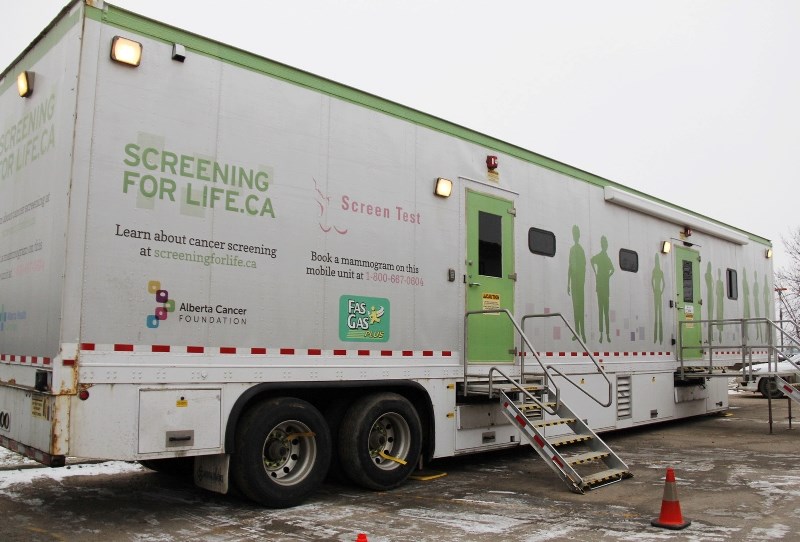One in eight women will be diagnosed with breast cancer in their lifetime, and Screen Test is hoping to always be one step ahead.
Screen Test is a mobile mammogram clinic that travels to over 120 communities, including Bonnyville, every year. It offers free mammogram screening for women through Alberta Health Services.
“A screening mammogram can find breast cancer in its earlier stages, when it's easier to treat. When we find it earlier, the likelihood of surviving is so much better. We want to encourage women not to wait until they have a problem like a lump. Come in and get screened regularly. Make it a part of your regular routine, and really take advantage of the service while it's in your community,” said Harmony McRae, health promotion facilitator for Screen Test.
The clinic will be at the Bonnyville Covenant Healthcare Centre over the course of January. Residents can call and make an appointment for sessions on the 13, 15 to 20, or the 22 to 25.
Screen Test's target group is women between the ages of 50 to 75. It's during those 25 years that women are most likely to be diagnosed with breast cancer.
“A lot of women don't realize breast cancer is still an issue in Alberta and in Canada. It's the most common form of cancer diagnosed in women. One out of every eight women will be diagnosed in her lifetime,” McRae expressed.
Although 50 to 75 are the most common ages for screening, Screen Test will also accept women between the ages of 40 and 49, however, the procedure is optional and a referral from their family doctor is required.
“In their 40s, they will be screened every year until they're 50, and then it's every two years for most women,” expressed McRae. “For women aged over 75, if they're feeling healthy and well, they can book a mammogram, but it's optional for them and they should probably talk to their doctor about it as well.”
For women under 40, McRae explained, screening mammograms are not recommended.
“It's not really a useful test for them. If they do have issues or a family history of breast cancer, they need to speak with their doctor about it, and then they may send them for other tests such as an ultrasound. We wouldn't see them at Screen Test.”
The service has been attending rural Alberta communities since 1991, and has grown exponentially since its early years. It was started as a way to bring breast cancer screening to rural Albertan women who weren't getting regular or timely screenings otherwise.
“One of the reasons was not all of them have it available in their community,” McRae noted.
The service hasn't been the only part of the mammogram world to develop. The method of screening has improved over the years, resulting in less discomfort for women being tested.
“That's the big thing, is technology has advanced. It's not the old film screen where you really compress the breast to get a good picture. The digital equipment we have now is state-of-the-art. It's a more comfortable exam. We don't have to use as much pressure. There is some (discomfort), but it shouldn't be painful,” said McRae.
Getting tested is simple; all women need to do is book an appointment by calling Screen Test's toll free line.
On the day of their screening, they arrive five-minutes early wearing a two-piece outfit.
“We have a short questionnaire for them to fill out, and it just asks about their family history with breast cancer and things like that,” McRae said.
Once they're finished, they're taken to an exam room for the test where they will take a total of four images, two on each side of the breast.
The whole process takes about 10-minutes.
Their results will come via mail about two weeks later. If any abnormalities are noticed, Screen Test will inform the client and their family doctor.
“We notify their doctor because all follow-up is coordinated through their family doctor,” explained McRae.
For those who may be weary about the process, or are concerned they may feel discomfort, McRae has a few tips.
“One thing a client can do is not drink coffee before their exam, and maybe take a Tylenol if they find it uncomfortable,” she said. “Coffee can make breast tissue a bit more sensitive. We're not exactly sure why, but if you don't drink coffee before your test, that can help a little bit.”
Women are encouraged to call the toll free line with any questions leading up to their appointment.
“Overall, it's not as bad as it used to be, and most clients say it's better than they have ever had before. Technology, as it gets better, it (the test) is getting better and less painful or uncomfortable for women,” McRae expressed.
For more information, or to book an appointment, call Screen Test's toll free number at 1-800-667-0604.



